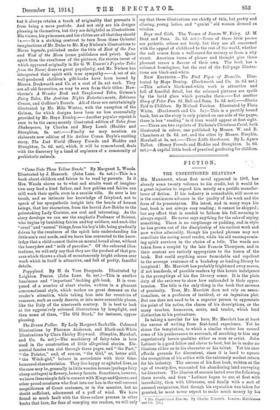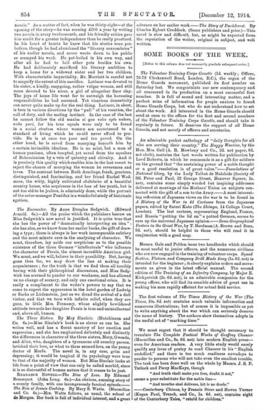FICTION.
THE UNPETITIONED HEAVENS.*
Mn. MARRIOTT, whose first novel appeared in. 1901, has already some twenty volumes to his credit, but it would be a great injustice to regard him merely as a prolific manufac- turer of fiction. If his industry is remarkable, still more so is the continuous advance in the quality of his work and the form of its presentation. His latest, and in many ways his best, book is not always easy reading ; it cannot be skipped ; but any effort that is needed to fathom his full meaning is always repaid. He never says anything for the sake of saying something. There is no surplusage or padding, and inatyle he has grown out of the discipleship of his earliest work and now writes admirably, though his packed phrases may not conciliate the racing novel reader, while his old uncompromis- ing spirit survives in the choice of a title. The words are taken from a couplet by the late Francis Thompson, and in their context are entirely appropriate to the lesson of the book. But could anything more formidable and repellent to the average customer of a bookshop or lending library be imagined ! Mr. Marriott has probably frightened away scores, if not hundreds, of possible readers by this heroic indulgence in the promptings of his fine literary sense. It is the plain duty of the reviewer to show how unfounded is their appre- hension. The title is the only thing in the book that.savours of preciosity. True, Mr. Marriott does not rely on sensa- tionalism, or a profusion of incident, or an ingenious plot. But one does not need to be a superior person to appreciate the point of his satire, the charm of his descriptions, or the many touches, humorous, acute, and tender, which lend distinction to his portraiture.
In taking a novelist for his hero, Mr. Marriott has at least the excuse of writing from first-hand experience. Yet he shuns the temptation, to which a similar choice has caused some of his predecessors to succumb, of ascribing to him any superlatively heroic qualities either as man or artist. John Latimer is a good fellow and clever to boot, but he is under no illusions either as to his character or his talent. Yet his case affords grounds for discontent, since it is hard to square the recognition of his critics with the extremely modest return for his industry. The success of his first book, written at the age of twenty-five, warranted his abandoning land surveying for literature. The illusion of success lasted over the following three novels, and then "Latimer began to see, at first with incredulity, then with bitterness, and finally with a sort of amused resignation, that though his reputation was taken for granted, he must never expect to make much money by his
• The UtipetVicncd Ecarnts. Ty Charles Maniott. Leaden: Hutchinson and Co. [es..1 novels." As a matter of fact, when he was thirty-eight—at the opening of the story—be was earning £300 a year by writing two novels in every twelvemonth, and his friendly critics gave him credit for a greater independence than he really practised. In his heart of hearts he knew that his stories were pot- boilers, though he had abandoned the "literary coxcombries " of his earlier novels, and never wrote down to his public or scamped his work. He pot-boiled in his own way, and after all he had to boil other pots besides his own. He had deliberately sacrificed his literary ambition to keep a home for a widowed sister and her two children. With characteristic impartiality, Mr. Marriott is careful not to magnify the extent of this sacrifice. Latimer was devoted to his sister, a kindly, easygoing, rather vulgar woman, and still more devoted to his niece, a girl of altogether finer clay. The joys of home life went far to outweigh the harassing responsibilities he had assumed. Yet vicarious domesticity can never quite make up for the real thing. Latimer, in short, is torn in various directions by the " pull " of his vocation, the call of duty, and the mating instinct. In the case of the last he cannot follow the old maxim si qua voles apte nubere, nube pari, for his true equals were only to be found in a social stratum where women are accustomed to a standard of living which he co uld never afford to pro- vide. He is at once too poor and too proud. On the other band, he is saved from marrying beneath him by a certain invincible idealism. He is no saint, but a man of human passions, often tempted, yet saved from the squalors of Bohemianism by a vein of quixotry and chivalry. And it is precisely this quality which enables him in the last resort to reject the chance of marrying the woman he reverences and loves. The contrast between Ruth .Armitage, frank, gracious, distinguished, and fascinating, and her friend Rachel Wed- more, the witty, highly cultivated chatelaine of a beautiful country house, who acquiesces in the loss of her youth, but is not too old to be jealous, is admirably done, while the portrait of the actor-manager Pontifex is a wonderful study of histrionic egotism.















































 Previous page
Previous page